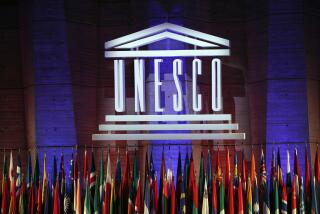M’Bow a Question Mark for UNESCO : In Its 40th Year, Group Could Be Nearing an Irreparable Rift
- Share via
PARIS — When the U.N. Educational, Scientific and Cultural Organization met for the first time in 1946, its founders looked upon themselves as visionary intellectuals brimming with hope for the future.
“I have faith in UNESCO,” said French Socialist politician Leon Blum, who presided over the first session at the Sorbonne in Paris, “because I have faith in peace.”
Now UNESCO, which celebrated its 40th anniversary Tuesday with art exhibits, concerts, dances and speeches, is an embattled organization whose bureaucrats and delegates seem to have only one concern about the future--whether Amadou Mahtar M’Bow, the controversial director general, means what he says about retiring next year.
May Lose More Members
If he does not retire, in the view of many analysts, UNESCO, which has already lost the United States and Britain as members, will probably lose more Western nations and perhaps disintegrate.
Pressed about his intentions by journalists who surrounded him at a press reception on the anniversary, M’Bow, a 65-year-old Senegalese, said he will stand on the statement he made to UNESCO’s executive council a month ago and say no more about the subject.
But some analysts insist that they find some ambiguity in the statement. M’Bow, whose second six-year term will expire in 1987, told the council: “I am not going to ask for a third term. I have been touched deeply by the numerous countries . . . that have expressed an intention to propose my reelection. I am convinced that they will see in my attitude a desire to make a positive contribution toward the mutual confidence that should exist between all members of the international community.”
A Game of Power
In the view of some UNESCO watchers and employees, these words left open the possibility that he would accept a draft for reelection, and a guessing game has been going on in UNESCO corridors in the last few weeks about whether he really will leave. The game, in a sense, reflects his power, for many analysts are convinced that M’Bow, despite all the accusations of megalomania and mismanagement against him, has enough Third World support among the 159 member states to win reelection if he tries.
Talking with reporters at the reception, M’Bow hardly sounded like a defeated figure retreating under fire. He insisted that UNESCO has demonstrated its vitality in the face of the withdrawal by the United States and Britain. He said the United States is not attacking UNESCO as much as it is attacking all multilateral organizations in a campaign that threatens the United Nations itself.
“There will be a North-South crisis inside UNESCO,” he said, using the jargon for a conflict between the industrialized and developing nations, “no matter who is director general.”
Assails Critics
M’Bow has taken the position for some time that much of the criticism directed at him comes from white critics who want to belittle Africa. Replying, for example, to criticism of his lavish living quarters, M’Bow said in a recent issue of the Paris newsmagazine Nouvel Observateur, “Am I supposed to live in a hut in the middle of Paris just because I am an African?”
M’Bow said that he and UNESCO have been victims of a campaign of disinformation led and coordinated by the conservative Heritage Foundation in the United States.
No consensus has formed as yet behind any candidate to succeed M’Bow. Some possibilities that have been named in recent press reports include Enrique Iglesias, the Uruguayan foreign minister; Kalevi Sorsa, the Finnish prime minister; Kurt Fugler, the former Swiss president; Sadruddin Aga Khan, the former U.N. high commissioner for refugees, and Butros Butros Ghali, the Egyptian foreign minister.
U.S. Pulled Out
The United States, when it withdrew at the end of 1984, accused the UNESCO bureaucracy of mismanagement and involving itself in political issues like disarmament that, in the American view, does not fall within the province of UNESCO.
For many years, UNESCO had angered leading American newspapers for advocating “a new world information order” that, in the American view, would severely restrict world news coverage under the guise of loosening the virtual monopoly of Western news agencies on distributing news in the Third World.
Throughout the controversy, American officials were careful to say they had no personal quarrel with M’Bow and were not insisting on his departure, despite all the reports that his autocratic rule was responsible for most of the mismanagement and most of the infusion of politics. But many analysts believe M’Bow could have averted the American withdrawal by resigning.
More to Read
Sign up for Essential California
The most important California stories and recommendations in your inbox every morning.
You may occasionally receive promotional content from the Los Angeles Times.













